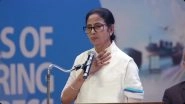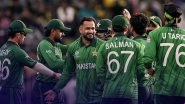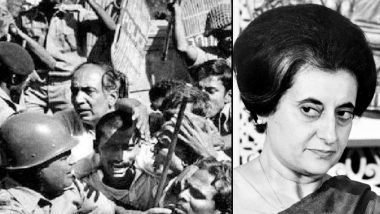Exactly 44 years ago, democracy had ceased to exist in India after the then prime minister Indira Gandhi declared an emergency in the country. The emergency period, which spanned 21 months, came to effect on June 25, 1975, lasting till March 21, 1977. The then President Fakhruddin Ali Ahmed officially announced the emergency under Article 352(1) of the constitution for ‘internal disturbance’. Emergency 1975: PM Narendra Modi, Amit Shah Remember Leaders Who Fought Against Indira Gandhi's Declaration.
Following the emergency, elections were suspended and civil liberties were curbed. Several human rights violations, including a forced mass-sterilisation campaign spearheaded by Indira Gandhi's son Sanjay, were reported during the period. Political opposition was completely crushed by putting prominent opposition leaders behind bars. Freedom of media was also curbed. Excesses of Emergency Should be Part of Curriculum: Vice President Venkaiah Naidu.
Some newspaper cutting during 1975-1977:
Black day in Indian democracy🇮🇳#Emergency pic.twitter.com/sAUlVpxEPM
— Subhadip Ray (@i_subhadip) June 25, 2019
Darkest chapter of Azad Bharat !
This day in 1975 Ex PM Smt Indira Gandhi murdered democracy n declared #emergency in India.
Under her dictatorship lakhs innocents were jailed & forced to undergo vasectomy.
Salute to brave Indians who fought against her n restored democracy🌺🙏 pic.twitter.com/LAdVx9QXs4
— Major Surendra Poonia (@MajorPoonia) June 25, 2019
What lead to the Emergency:
On June 12, 1975, almost two weeks before the emergency was announced, Justice Jagmohanlal Sinha of the Allahabad High Court found the prime minister guilty on the charge of misuse of government machinery for her election campaign. The court declared her election null and void. Gandhi was unseated from MP seat in Lok Sabha. She was also barred from contesting any election for an additional six years. However, charges such as bribing voters and election malpractices were dropped against Gandhi. BJP to Observe Black Day to Mark 1975 Emergency Decision As Undemocratic.
Gandhi then challenged the High Court's decision in the Supreme Court. Justice V. R. Krishna Iyer, on June 24, 1975, upheld the High Court judgment. However, she was allowed to continue as Prime Minister as she had a right to appeal against the decision. The emergency was extended after every six months till March 1977. Finally, after 21 months of the emergency, Gandhi had decided to hold elections.
The after-effect of emergency:
However, in the general elections which were held after the emergency, the Congress was reduced to only 154 seats in the Lok Sabha. Even Gandhi and her son lost their seats. Morarji Desai leader of the Janata alliance became the prime minister of the country. He was the first non-Congress prime minister after the independence.
Indira Gandhi's interview after her defeat in the 1977 elections:
According to Amnesty International, around 1,40,000 people had been arrested without trial during the Emergency. Opposition leaders were arrested, and were jailed. Newspapers were not allowed to carry any anti-government news. Overall, those 21 months were considered to be the darkest period in Indian democracy.
(The above story first appeared on LatestLY on Jun 25, 2019 11:21 AM IST. For more news and updates on politics, world, sports, entertainment and lifestyle, log on to our website latestly.com).













 Quickly
Quickly


